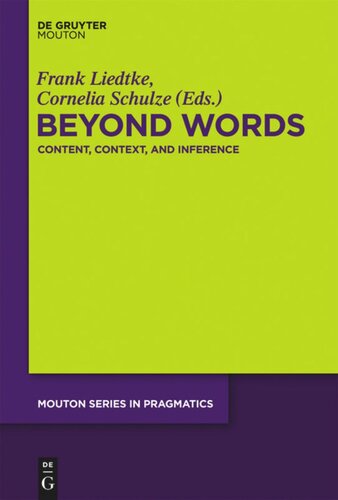

Most ebook files are in PDF format, so you can easily read them using various software such as Foxit Reader or directly on the Google Chrome browser.
Some ebook files are released by publishers in other formats such as .awz, .mobi, .epub, .fb2, etc. You may need to install specific software to read these formats on mobile/PC, such as Calibre.
Please read the tutorial at this link: https://ebookbell.com/faq
We offer FREE conversion to the popular formats you request; however, this may take some time. Therefore, right after payment, please email us, and we will try to provide the service as quickly as possible.
For some exceptional file formats or broken links (if any), please refrain from opening any disputes. Instead, email us first, and we will try to assist within a maximum of 6 hours.
EbookBell Team

4.4
12 reviewsIn pragmatics, it is widely accepted that the overall meaning of an utterance performed as part of a verbal interchange is basically underdetermined by the meaning of the sentence uttered. What counts as having been said for most contemporary authors goes far beyond sentence meaning. Rather, it has to be considered as a complex utterance level combining semantic knowledge and context-driven, pragmatic information as an integrated whole.
The focus of the present book lies on central questions about the nature, the function and the acquisition of pragmatic inferencing strategies. The question of the relation between the explicit and the implicit side of verbal communication and its mutual delimitation is addressed. What is the character of pragmatic inferences, wherever they may be situated in a descriptive model? Are they nonce inferences arising anew in each act of communication, or do we have to conceive of them as based on regularities and conventions? What is an adequate model of the acquisition of the skills which are relevant for mastering the inferential processes leading to an adequate interpretation of utterances? And what is the relation between a theory of pragmatic enrichment and optimality theory with an OT pragmatics as a possible result?